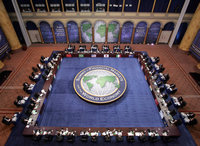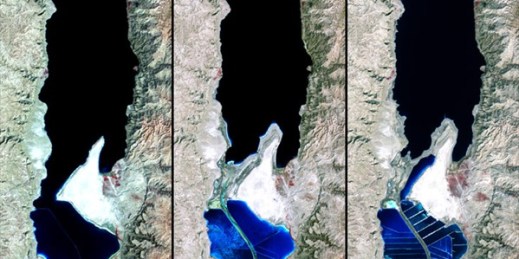World PoliticsReview managing editor, Judah Grunstein, appeared on France 24’s French-language paneldiscussion program, Le Débat, to discuss France’s reintegration of the NATO integrated military command, alongside Paul Quilès (former minister of defense under François Mitterand), Guillaume de Rougé and Jean-Louis Dufour. Part one can be seen here. Part two can be seen here.
North America Archive
Free Newsletter
Spencer Ackerman introduces us to the new SACEUR (Supreme Allied Commander Europe, otherwise known as NATO’s military commander), Adm. James Stavridis. It’s the first time a Naval officer has held the post. Note that the alliance, along with the rest of the world, is currently engaged in anti-piracy patrols off of Somalia. That also corresponds to a shift in strategic focus among Western general staffs towards the Indian Ocean and Asia as the most likely threat horizon, with an emphasis on naval rivalries. This is admittedly tea-leaf reading, but I wonder if this doesn’t represent Washington’s desire to reassert the […]
Here’s what Mark Thoma has to say about where West is (via Andrew Sullivan): The key, then, is to have good jobs waiting for workers when they aredisplaced due to inevitable (and desirable) technological change or tojobs moving overseas, jobs that are every bit as good or better thanthe jobs they left. That is where we are falling short. The new jobs weare creating are not as good as the jobs we are losing, when workersare forced to find new jobs they don’t tend to do as well as they didin their previous job, and that is the source some […]
Nikolas Gvosdev echoes a lot of what I’ve been writing and thinking about NATO and the EU in recent weeks: NATO expanded at a time when Russia seemed prostrate and Article 5commitments could be extended without much thought — then came theRussia-Georgia war. Plus NATO’s continued unraveling over Afghanistandoesn’t inspire much confidence. Twenty years ago, NATO as asmaller group was much more formidable — and the EU was born atMaastricht with a smaller number of states whose economies were muchmore aligned. Are either stronger today as a result of expansion? I’m not sure if “stronger” is the right word. I’d […]
In a piece over at Foreign Affairs’ revamped Website, Rawi Abdelal and Adam Segal echo what I’ve been saying about the impact of the global financial crisis on this round of globalization. Namely, that as big as the economic challenges of the crisis are, the political challenge it presents might be bigger: The current crisis has caused the destruction of value, the contractionof capital, a decline in consumption, and an increase in unemployment.But its ultimate impact may be even more pervasive, because the crisishas further undermined the political legitimacy of the free movement ofcapital, goods, and services. The legitimacy problem […]
The folks over at Foreign Policy were kind enough to invite WPR managing editor Judah Grunstein to contribute a piece on France’s reintegration of NATO. Here’s a taste: Sarkozy’s decision is part of a broader shift towardreaffirming France’s place in what he calls the “family of the West” — aproject he began upon taking office in May 2007. In concrete terms, that hasmeant a more vocal opposition to Iran’s nuclear ambitions, a recommitment tothe NATO war effort in Afghanistan, and demonstrations of French solidaritywith U.S. objectives in Iraq. All of those initiatives have generated charges of apro-American alignment. But with […]

When finance ministers of the Group of Twenty nations come together on Friday to prepare for the upcoming G-20 summit, observers, journalists and analysts will no doubt focus on disagreements among the members over how to tackle the ongoing world economic crisis. After all, differing views on the best course of action have already stolen the headlines. To be sure, points of contention do exist and they could make for a tense meeting at West Sussex this weekend, as finance ministers struggle to come up with a productive and forceful agenda at the April summit in London. And yet, the […]
This was my intuitive reaction after reading this Matthew Yglesias post: So without a recovery in the U.S. and global economy, there cannot be asustainable recovery of Chinese growth. And with the U.S, recoveryrequiring lower consumption, higher private savings and lower tradedeficits, a U.S. recovery requires China’s and other surplus countries'(Japan, Germany, etc.) growth to depend more on domestic demand andless on net exports. But domestic-demand growth is anemic in surpluscountries for cyclical and structural reasons. So a recovery of theglobal economy cannot occur without a rapid and orderly adjustment ofglobal current account imbalances. But I’m not Nouriel Roubini,so I […]
I was about to second this Secrecy News item by expressing my disappointment with the overhauled White House Website. Say what you will about what went on behind the scenes under the Bush administration, but its Website archived the president’s official statements and executive orders. Then I clicked through to link to the new WH site and saw that since the last time I’d checked it out, they added a Presidential Actions option under the “Briefing Room” menu tab that includes Executive Orders, memoranda and proclamations. There’s also an appointments and nominations option under the same menu tab. So, good […]
The Times reports that panicky American investors are repatriating their capital, and the Chinese haven’t hit the brakes on buying up American debt, either. That’s exacerbating the impact of the financial crisis globally by soaking up liquidity that could finance debt elsewhere. In other words, money is still flowing uphill, largely because high ground is safer when the water’s rising in the valley. But capital from emerging markets is increasingly flowing towards developed economies as well, where it is busy buying up assets. 2point6billion reports: A recent KPMG survey entitled – ‘Emerging Markets International Acquisition Tracker’points out that emerging-to-developed deals […]

Remember the age of globalization, if you can. The world was flat. High finance was king. Swelling economic prosperity had lifted hundreds of millions out of poverty. Capitalism, in a variety of configurations, stretched from one end of the earth to the other. Even individual states were fading in importance, and the threat of a great-power war had all but come to an end. How quickly that utopia has been shattered. In short, the world is very much round again. Investment banking has collapsed. The global financial crisis is elbowing the poor aside. Corruption and rampant irresponsibility have resulted in […]
If you’ve been following the “COIN will breed COIN” debate, check out these posts by Andrew Exum, Matthew Yglesias and Spencer Ackerman. If you haven’t, check them out anyway. It’s an interesting discussion of whether in makingCOIN a doctrinal focus of operations, the U.S. military will be tempted to intervene in counterinsurgencies of choice. It’s a subject I’ve written about often over the past 18 months. If anything has reassured me that my worries weren’t warranted, it’s been Secretary of Defense Bob Gates’ emphasis on “strategic balance.” Exum’s insistence that COIN practitioners are not necessarily COIN enthusiasts rings true, too. […]
Yesterday I dashed off a post expressing concern that COIN’s low-intensity, population-centric tactics might eventually make their way into domestic policing via returning vets. Today at Small Wars Journal, Ben Fitzgerald and Scott Brady discuss the need for domestic policing to make its way into COIN’s low-intensity, population-centric tactics via deployed civilian law enforcement officers: From a military perspective, the value of law enforcement may be seenas enhancing the military’s conduct of population centric operationsthrough improved patrolling techniques, investigation, communityengagement, graduated use of force etc. Separate to the militaryperspective is the potential to deploy civilian law enforcementpersonnel to essentially perform […]
Andrew Sullivan featured this T-Mobile ad, which is basically the first commercial usage of a “spontaneous” flash mob (at least that I’ve seen). My first reaction to the ad’s conceit, “Life’s for Sharing,” was that what was being portrayed — and shared — wasn’t life, but a carefully contrived and planned commercial. Then it occurred to me that the flash mobs on which the ad is based are just as carefully contrived and planned as the ad itself. Given my reading habits lately, and my natural apocalyptic streak, the train of thought then led to the ways in which the […]
I had some vague thoughts swirling around the cranium, and a French word I ran across in some weekend reading helped crystallize them: s’immerger, which means to immerse oneself, but also to submerge oneself. The word corresponds to the English immerge, which I hadn’t realized existed. (That rumbling sound you hear is my Shakespearian-scholar and Greek- and Latin-speaking grandfather rolling over in his grave.) It immediately made me think of President Obama’s Camp Lejeune speech, which put the withdrawal from Iraq in the context of a regional diplomatic fabric. The same approach informs the regional approach to the Afghanistan War, […]

The war looks eerily familiar: beheadings, assassinations of police and public officials, terrorized businesspeople, extorted schoolteachers, and in five years more than 230 American civilians dead in the crossfire. All this could easily describe the battle in Afghanistan or Pakistan, but the reality is closer to home, where an increasingly gruesome and threatening war is threatening to boil over the United States’ southern border with Mexico. Summing up decades of policy, three former Latin American heads of state last week declared, “The war on drugs has failed.” Fernando Henrique Cardoso of Brazil, César Gaviria of Colombia and Ernesto Zedillo of […]

For millennia, the Dead Sea has been fed by the sweet waters of the Jordan River while losing only pure water to relentless evaporation. The collected salts left behind have resulted in an inhospitably briny lake eight times saltier than the sea, topped by a thin layer of the Jordan’s relatively less-dense fresh water. The differing salinity levels between the river and the lake kept the Dead Sea in a perpetually layered state, even while the lake’s overall water level remained fairly constant, since evaporation from the lake’s surface occurs at roughly the rate of the natural flow of the […]
